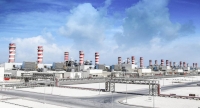
The Production of Desalinated Water in the Kingdom of Saudi Arabia involves treating seawater to address the water deficit and meet the growing demand across the Kingdom. Currently, there are approximately forty-one desalination systems in the Kingdom, consisting of thirty-three public sector systems and eight private sector systems. Water management in the Kingdom is governed by the Water Law issued in 2020 through a royal decree and Council of Ministers resolution. This law defines desalina...
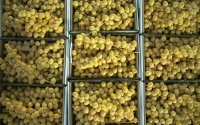
Balah in the Kingdom of Saudi Arabia is one of the stages of palm fruit development in the Kingdom of Saudi Arabia . It starts with a green color and a small size resembling sour grapes. As it matures, its color shifts to red or golden. During the stage when the Balah appears on the palm, farmers reduce the load on the palm tree by removing al-Shays , al-Sakhl , or al-Saysa , which are unpollinated Balah on the stalks. Thus, every three Balah are in one cluster. Stages of Balah development in t...
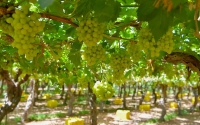
Grapes are cultivated in most provinces of the Kingdom of Saudi Arabia, with cultivation concentrated in Qassim , Tabuk , al-Jawf , al-Madinah al-Munawwarah , Makkah al-Mukarramah , al-Bahah , Aseer , Riyadh , Hail , Najran , and the Northern Borders . Its production season in the Kingdom extends from June to September each year. The Kingdom produces 101.57 thousand t of grapes annually, with a cultivation area exceeding 3,746 ha, achieving a self-sufficiency rate of 59 percent, according to a ...
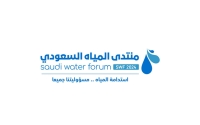
The Saudi Water Forum (SWF) is a global gathering held in Riyadh City , In the Kingdom of Saudi Arabia. It brings together experts, researchers, and investors in the water sector to discuss challenges and propose integrated solutions. It is organized by the Ministry of Environment, Water, and Agriculture in collaboration with relevant entities. The first edition of the forum was launched in March 2019. Objectives of Saudi Water Forum SWF aims to enhance cooperation among governmental, private, ...
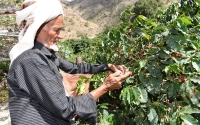
Yes, they are, particularly in the mountainous southwestern regions of the Kingdom of Saudi Arabia, such as Aseer , al-Bahah , and Jazan Provinces. These provinces are known for their thriving coffee cultivation and are the most productive in the country. The coffee crops are divided into two main types: Saudi Khawlani coffee beans, which are one of the rarest and most valuable types of coffee beans in the world, and Harari coffee beans. Jazan Province alone has approximately 1,985 coffee bean ...
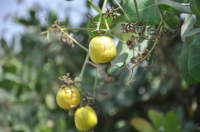
Guava cultivation in the Kingdom of Saudi Arabia abounds in Jazan Province , located southwest of the Kingdom of Saudi Arabia. The area is well-known for its seasonal fruit production, yielding 118,080 t of tropical fruits annually. Jazan Province has approximately six thousand guava trees within its agricultural lands, yielding around sixty t of guavas annually. Guava fruits ripen in the fall and early winter in the Kingdom. The fruit can be eaten fresh or processed into juice or jam. Typicall...
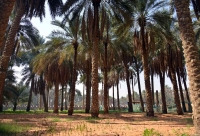
Palm Care in the Kingdom of Saudi Arabia refers to the agricultural care processes carried out by farmers. These practices include offshoot care, irrigation, trimming, pruning, skirting, defibring, and covering. The Kingdom has placed significant importance on palm trees. The Ministry of Environment, Water, and Agriculture provides several services for the care of palm trees in the Kingdom , including guidance services, methods for controlling pests, insects, and diseases, and organizing agricu...
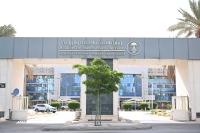
The Water Regulator in the Kingdom of Saudi Arabia is the Regulatory Affairs Agency of the Ministry of Environment, Water, and Agriculture . It is the entity responsible for regulating all activities related to the provision of services of water and sanitation and all water sources and affairs, including those in the special provinces, except for dual production activities and Zamzam water . Dual production refers to the simultaneous production of electricity and desalinated water or steam, or ...
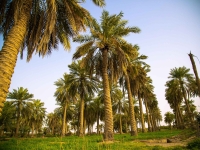
Uses of Palm in the Kingdom of Saudi Arabia serve a wide array of purposes, contributing to various industries including medicine, oils, fuel, fertilizers, and construction materials. Palm by-products are also used in several manufacturing sectors within the Kingdom. Uses of Palm in food Palm dates are popular in the Kingdom, as they are prepared on dining tables, on public and private occasions, and when receiving guests, along with Saudi coffee . Iqt and dates are consumed with Arabic coffee ...
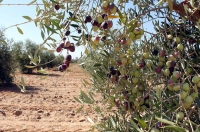
Olives are primarily grown in several provinces of the Kingdom of Saudi Arabia, including al-Jawf , Hail , and Tabuk . These northern provinces enjoy a Mediterranean climate, which is a crucial factor for successful cultivation. Olives are also grown in some southern provinces, such as al-Bahah and Aseer , where the climate and soil conditions are suitable. As of 2018, olive trees covered about 52,000 ac in the Kingdom. Approximately 20 percent of the production ...
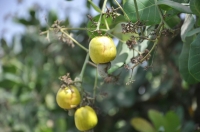
A variety of tropical fruits are cultivated in Jazan Province , located in the southwest of the Kingdom of Saudi Arabia. These include mangoes , guavas, papayas, figs, and bananas, which farmers are keen to nurture and propagate for their economic returns. The number of fruit-bearing trees has exceeded 4,336,832 trees, with annual production reaching about 107,305 t. Banana trees are the most abundant type in the province, with 1,159,844 trees producing about 34,795 t annually. Mangoes come nex...
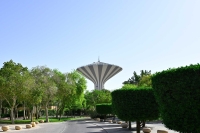
The Riyadh Water Tower was constructed to increase the water pressure in the public water network to meet the water needs of Riyadh's citizens, as well as ensure it reaches all neighborhoods. The Riyadh Water Tower is one of the ancient landmarks in Riyadh City . It is located in al-Murabba Neighborhood, near King Abdulaziz Historical Center . The Riyadh Water Tower was constructed in 1971 at the order of King Faisal Bin Abdulaziz Al Saud . Its construction was supervised by the Ministry o...